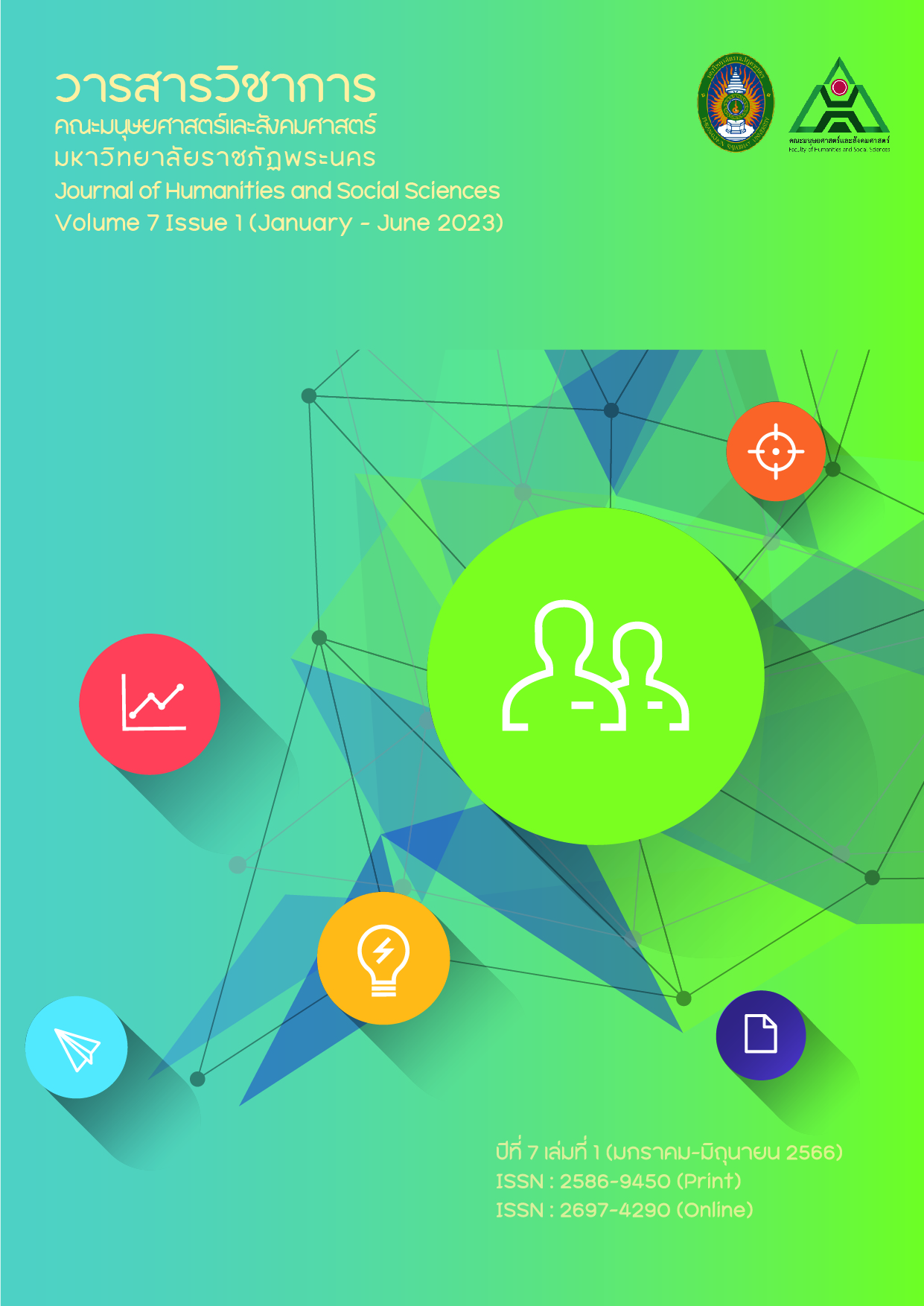การพัฒนาอย่างมีส่วนร่วม : การพัฒนาชุมชนอย่างยั่งยืน
Main Article Content
บทคัดย่อ
บทความวิชาการนี้มีวัตถุประสงค์เพื่อนำเสนอการพัฒนาอย่างมีส่วนร่วมสู่การพัฒนาชุมชนอย่างยั่งยืนที่เกิดขึ้นในประเทศไทยทั้งในการพัฒนาชุมชนชนบทและชุมชนเมือง และเพื่อเสนอแนะแนวทางการพัฒนาชุมชนอย่างยั่งยืนที่สอดรับกับความต้องการของประชาชนและสอดคล้องกับบริบทของประเทศ ผลการศึกษาพบว่า การพัฒนาชุมชนมีเป้าหมายสำคัญ 2 ประการคือ การพัฒนาคนให้มีความสุข และการพัฒนาชุมชนให้เข้มแข็ง การพัฒนาคนและชุมชนดังกล่าวให้เกิดผลอย่างยั่งยืนเป็นการพัฒนาที่ครอบคลุม 3 มิติ ได้แก่ มิติทางเศรษฐกิจ มิติทางสังคม-วัฒนธรรม และมิติทางสิ่งแวดล้อม ทั้งนี้ต้องเป็นการพัฒนาอย่างมีส่วนร่วม โดยพิจารณาจาก (1) รูปแบบการมีส่วนร่วม 4 รูปแบบ ได้แก่ การมีส่วนร่วมในการตัดสินใจ การมีส่วนร่วมในการดำเนินงาน การมีส่วนร่วมในการรับผลประโยชน์ และการมีส่วนร่วมในการประเมินผล (2) ลักษณะการมีส่วนร่วม 4 ลักษณะ ได้แก่ การมีส่วนร่วมในเชิงการกระทำ การมีส่วนร่วมในเชิงเงินงบประมาณ การมีส่วนร่วมในเชิงความรับผิดชอบ และการมีส่วนร่วมในเชิงการตัดสินใจ และ (3) ระดับการมีส่วนร่วม 6 ระดับ ได้แก่ ระดับการให้ข้อมูล ระดับการเปิดรับความคิดเห็นจากประชาชน ระดับการปรึกษาหารือ ระดับการวางแผนร่วมกัน ระดับการร่วมปฏิบัติ และระดับการควบคุมโดยประชาชน การพัฒนาชุมชนอย่างมีส่วนร่วมดังที่กล่าวมานั้นนำไปสู่การพัฒนาชุมชนอย่างยั่งยืน นั่นคือเป็นชุมชนที่คนมีความสุขและเป็นชุมชนที่เข้มแข็ง ทั้งด้านเศรษฐกิจ สังคม-วัฒนธรรม และสิ่งแวดล้อม
Article Details
เอกสารอ้างอิง
Anukanon, S. (2004). Environmental Economics. Bangkok: TPN Place Limited Partnership.
Cohen, John M. & Uphoff, Norman. (1980). Participation’s Place in Rural Development, Seeking Clarity Through Specificity, World Development. P 213.
Cohen, S.L. (1996). Mobilizing Communities for Participation and Empowerment. In
Servaes, J., Jacobson, T.L., & White, S.A. (eds), Participatory Communication for
Social Change. New Delhi: Sage.
Community Organizations Development Institute. (2021). ‘21 Years CODI. From Slums
to Homes Beautiful by the Canal, Price of a Hundred Thousand - a view of A
Million. Retrived from https://web.codi.or.th/20211011-27787/ [2022, 23 Dec.]
Community Organizations Development Institute. (2021). New House - New Life of the
Ladprao - Prem Prachakorn Canal Community. Retrived from
https://web.codi.or.th/20210716-25758/ [2022, 23 Dec.]
Community Organizations Development Institute. (2021). Residential Development of
Communities along the Canal. Retrived from https://web.codi.or.th/20210716-
/ [2022, 23 Dec.]
Creighton, J. L. (2005). The Public Participation Handbook: Making Better Dicisions through
Citizen Involvement in Thai Context. Journal of Environmental Management.
(1), 123-141.
Klalin, Tomislav. (2018). The Concept of Sustainable Development: From Its Beginning to
the Contempolaly Issues. Zagreb International review of Economics & Business,
(1), 67-94.
Maejo University. (2022). Ban Wang Pong Community Learning Center. Retrieved
from https://erp.mju.ac.th/openFile.aspx?id=MTAxNTQz [2022, 22 Dec.]
Office of Community Strengthening, Community Development Department. (2016).
Community Knowledge Management Handbook. Bangkok: Department of
Community Development.
Office of Muangkaew Municipal District. (2022). OTOP Nawatwithi Ban Wang Pong
Tourism Community Moo 6 , Muangkaew Subdistrict, Mae Rim District, Chiang
Mai Province. Retrieved from
http://muangkaew.go.th/ckfinder/userfiles/files/TourismCommunity%20OTOP%20
Nawatwithi%20%20BanWangPong(1).pdf. [2022, 22 Dec.]
Office Of Natural Resources and Environmental Policy and Planning. (2017).
Environmental Quality Management Plan 2017-2021. Bangkok: Ministry of
Natural Resources and Environment.
Office of the National Economics and Social Development Council. (2022). About SDGs.
Retrieved from https://sdgs.nesdc.go.th/about-sdgs/ [2022, 22 Dec.]
Open Development Thailand. (2565). Sustainable Development Goals. Retrieved
from https://thailand.opendevelopmentmekong.net/th/topics/sustainable-
development-goals/#SustainableDevelopmentGoals [2022, 22 Dec.]
Phonsi, S. (2004). Theory and Principle of Community Development. (5th ed.). Bangkok: Odeon Store.
Phoochinda, W. (2015). Community Environmental Management based on Industrial
Ecology Concept. Bangkok: National Institute of Development Administration.
Phuangngam, K. (2010). Community and Local Self-Governance. Bangkok: Borpit
Printing.
Sritong, N. (2009). Increasing Leadership Potential in Community Development
Work. Bangkok: O. S. Printing
Sukkasem, C. (2014). Principles of Participation in Sustainable Community
Development. Bangkok: Chulalongkorn University Press.
Sunyavivat, S. (1983). Community Development. (3rd ed.). Bangkok: Odeon Store.
Uwannao, B. et al. (2011). Public Participation in Public Policy Processes. (2nd ed.).
Bangkok: A.P. Graphic Design and Print Company Limited.


